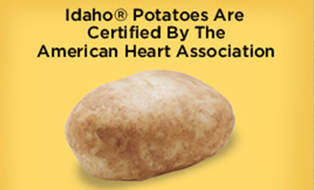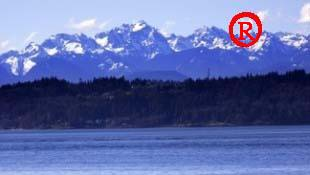Entries in Geographically Descriptive Trademarks (13)
Idaho Potatoes? In Turkey?
 An Idaho potato. Grown in Idaho.
An Idaho potato. Grown in Idaho.
Idaho potatoes? Grown in Turkey?
Last week, NPR aired a story about the Idaho Potato Commission’s reaction to a Turkish company’s effort to register IDAHO in connection with agricultural seeds in Turkey.
But not for potatoes, the company insists. They just like the foreign-sounding name.
Idaho apparently doesn’t have much of a reputation in Turkey — yet. It just doesn’t want its brand to go the way of other geographic names that were lost to genericide. Like Brussels with its sprouts or Cheddar and its cheese.
The story quotes Seattle’s Bob Cumbow on Idaho’s chances of protecting its geographical indication.
“[T]he whole idea of having enforceable geographical indications is still in discussion and dispute. The standards are going [to] vary from country to country and for that reason it’s going to be hit or miss where you can enforce these.”
Idaho’s hoping for a hit in Turkey. It’s registered various IDAHO marks in ten countries. Turkey’s not one of them, but I imagine that might soon change.
New Mexico Chile Legislation Shows Power of Certification Mark
This morning I awoke to a good trademark law story on NPR.
It’s about New Mexico farmers’ efforts to protect the brand behind the New Mexico chile pepper.
They lobbied for legislation that essentially creates a certification mark out of those words.
Right now, there aren’t any direct restrictions on using “New Mexico” in connection with chiles anywhere else. As the story put it, “For now at least, anywhere else in the country, a leather shoe could be called a New Mexico chile.”
New Mexico farmers recognize their chile peppers are prized. Their chiles also cost more to produce than, say, chiles from “old” Mexico. New Mexico farmers pay workers $7.25 per hour, while that’s what workers in developing nations make in a day.
So, unscrupulous growers outside New Mexico can call their chiles “New Mexico chiles” and grab a free ride on the New Mexico chile pepper’s reputation — without charging the premium price. Indeed, that’s reportedly what they’ve done.
Now, doing so would constitute a false designation of origin, which violates Section 43(a) of the Lanham Act, but that’s slightly beside the point.
The point is, New Mexico chile farmers have the right idea. Make their brand mean something specific. Like Champagne wine (which only comes from the Champagne region of France; blog post here), Parmesan cheese (which only comes from the Parma region of Italy; blog post here), and Wild American shrimp (which only are caught in the wild in the East Coast and Gulf of Mexico regions of the United States; blog post here). That way they can command the premium price they reportedly deserve, while stopping undeserving third parties from getting a free ride on their reputation.
A good lesson other producers can learn from.
IPKat’s blog post on the story — all the way from London — here.
Current "Olympic" Naming Problem Was Foreseeable in 1998

Why didn’t Washington State’s Congressional delegation prevent the Ted Stevens Olympic and Amateur Sports Act from granting a monopoly over the word “Olympic” without carving out a broader exception for Washington-based Internet sales?
That’s the question Seattle-area blogger Trish Wareing recently asked.
I think it’s a darn good one.
As previously discussed, the statute excepts trade names and trademarks from the United States Olympic Committee’s monopoly over the term when “it is evident from the circumstances that such use of the word ‘Olympic’ refers to the naturally occurring mountains or geographical region of the same name that were named prior to February 6, 1998, and not to the corporation or any Olympic activity” and “such business, goods, or services are operated, sold, and marketed in the State of Washington west of the Cascade Mountain range and operations, sales, and marketing outside of this area are not substantial.”
The last phrase is what’s unhelpful: “and … sales, and marketing outside of this area are not substantial.” Nowadays, everyone markets everywhere through the Internet. Couldn’t Washington’s legislators have figured that out when the statute was revised in 1998, and nipped this problem in the bud?
Ms. Wareing writes:
“As a Washington State resident and small business owner, I’m outraged that Washington State’s Congressional delegation was asleep at the wheel when this little ‘stay in Washington State’ clause was allowed to slip through unchallenged in the Stevens Act. Western Washington State is a tech savvy place. It is the home of Amazon.com (not to mention Microsoft and innumerable other dot coms, past and present). Was the value of internet marketing (especially for a growing small business) that obscure in 1998? If so, how come Amazon CEO Jeff Bezos was Time’s Man-of-the-Year in 1999?”
That’s a great point. Failing to foresee the havoc the statute would cause Washington’s many Olympic-named businesses when the statute was first enacted in 1978? Understandable.
But failing to foresee it when the statute was revised in 1998? Unforgivable.
Clever graphic: BlogFromAHermit.com
NYT Article Illustrates How Champagne Region May Be Watering Down Its Brand
Today’s New York Times reports on the imminent expansion of the Champagne appellation in France. (NYT map here; past STL discussion here.) Most of the article discusses the reason for the expansion — to make winemakers more money. Indeed, the article says once included in the Champagne zone, a hectare of land — two and a half acres — would jump in value from 6,000 euros to almost one million euros.
We get it. The Champagne designation is valuable.
What is largely missing from the discussion is why that is true. To me, the expansion suggests one of two things: either (1) the zone is imprecise as it has been drawn since 1927, meaning that some wine produced outside the zone possesses all the qualities of wine sold under the “Champagne” designation, or (2) the zone is precise as drawn, but is being re-drawn to include wine with different qualities anyway so producers with land outside the region can charge a premium for their wine once it is re-packaged and sold as “Champagne.”
In the interests of brand integrity, I would think Champagne trade groups would embrace the first option. However, I don’t see that happening. Instead, most of what I read suggests the expansion is being driven by economics.
For example, the NYT quotes the head of the Union of Champagne Houses as explaining: “The euro is rising and the dollar is falling, and soon we’ll have a real structural problem if the cost of the grape keeps increasing every year.”
This is the Champagne industry’s spokesperson. What I don’t hear him saying is that grapes grown one kilometer outside the zone are just as good as grapes grown inside the zone, so it only makes sense to include wine made from those grapes as “Champagne.” I instead hear him saying something akin to: “We have no choice but to expand because production costs and international economics are killing us.”
What does that say about the Champagne brand? The Champagne brand should immediately tell consumers: “If you buy Champagne, you can be assured your sparkling white wine will have qualities X, Y, and Z, which are worth the extra cost because Champagne is better than sparkling white wines made from grapes grown elsewhere.” By expanding the zone, this message risks being watered down.
The article does state: “The current Champagne growing region encompasses a patchwork of territory sprawling over 87,000 acres, in 319 villages. In March, a team of experts appointed by the French government approved more than 40 more communes, or communities, to add to the Champagne territory, zones that are now the subject of final appeals.”
That’s the message on which Champagne trade groups should focus: “The best scientists have scoured the French countryside. After exhaustive tests, they have discovered that grapes grown in certain neighboring areas share the identical qualities as grapes grown within the Champagne region. Rejoice! By recognizing these fine wines as Champagne, the Champagne you have come to love will soon be more plentiful!”
That’s a far cry from what I’ve been hearing so far.
Champagne Region Expands in Order to Expand Vintners' Profits

Champagne sparkling wine only comes from the Champagne region of France, right? Until the Champagne region of France moves, that is. The Institut national de l’origine et de la qualite, which governs the Appellation d’Origine Controlee designation for Champagne, is set to expand the appellation’s boundaries, which currently spans 319 villages in north-eastern France. What wasn’t “true” Champagne will soon be the real McCoy.
In other words, vineyards that arbitrarily got the stamp of approval soon will be joined by new vineyards that also arbitrarily get the stamp of approval.
The reason behind the move? Increased demand for Champagne in Russia and China.
Of course, this is great news for neighboring viticulturalists. A French official was quoted as saying: “If your vines fall on the wrong side of the divide, they will be worth 5,000 euros a hectare. On the other side they will be worth one million euros.”
I’m not saying that any vintner should be able to call its sparkling white wine “Champagne.” But this move emphasizes that economics, not distinctiveness, influences (or even drives) what’s approved and what’s not. That would seem to undermine why geographic indications exist in the first place.
